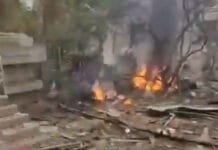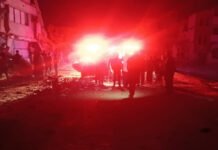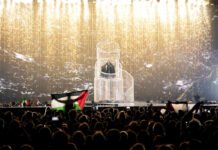The fragile ceasefire between Israel and Hamas is hanging by a thread after renewed Israeli airstrikes on Gaza late Sunday killed at least 28 Palestinians, including several children, according to local health authorities. The escalation came in response to mortar and drone attacks from Gaza that reportedly killed two Israeli soldiers and injured several others near the border town of Sderot.
The cycle of retaliation has cast fresh doubt on the month-long truce, which was mediated by Egypt and Qatar with backing from the United Nations and the United States.
“The situation is deteriorating fast,” warned Lynn Hastings, UN Humanitarian Coordinator for Palestine. “Both sides must act with restraint. Every new strike risks unraveling weeks of diplomatic effort and deepens civilian suffering.”
⚔️ What Sparked the New Violence
Israeli Defense Forces (IDF) officials confirmed that fighter jets targeted “Hamas command posts, rocket-launch sites, and arms depots” in northern and central Gaza. Videos circulating on social media showed massive fireballs lighting up the night sky as explosions rocked densely populated neighborhoods.
Hamas, in a statement released early Monday, accused Israel of violating the ceasefire and vowed a “response at the appropriate time.” The group also claimed responsibility for the earlier cross-border attacks, calling them a “retaliation for ongoing Israeli raids in the West Bank.”
“Israel’s aggression proves that it never intended for real peace,” said Fawzi Barhoum, Hamas spokesperson. “We will continue our struggle for liberation.”
The Israeli government defended its actions as “measured and necessary.” Prime Minister Benjamin Netanyahu said in a televised address:
“We will not allow terror groups to endanger Israeli citizens. The ceasefire does not mean surrender to attacks — it means peace under security.”
💔 Civilians Trapped in the Crossfire
As always, it is Gaza’s civilians who bear the brunt of renewed hostilities. The Gaza Health Ministry reported that at least 60 people were injured, many trapped under the rubble of collapsed residential buildings. Hospitals, already short of fuel and medicine due to the blockade, are overwhelmed.
“I saw my neighbors’ house explode,” recounted Abeer Al-Khatib, a mother of three from Gaza City. “We thought the war was over. Now we live in fear again every night.”
Electricity supplies have been cut in several districts, and humanitarian aid convoys were temporarily halted due to security risks at the Rafah crossing. The UN estimates that over 80% of Gaza’s 2.3 million residents rely on aid to survive.
🌍 International Reactions
Global leaders reacted swiftly to the renewed violence.
The White House expressed “deep concern” and urged both sides to “respect the ceasefire and prioritize civilian safety.”
Meanwhile, the European Union called for an emergency meeting of its foreign affairs council to discuss additional humanitarian assistance.
Egyptian mediators, who have played a key role in previous truces, dispatched a delegation to Tel Aviv and Gaza to restore calm. “Our efforts are ongoing, but the trust deficit is deep,” said an Egyptian official involved in the talks.
The UN Security Council has also scheduled an urgent closed-door session to assess the ceasefire’s future and the humanitarian crisis unfolding in the enclave.
⚠️ Why the Ceasefire Matters
The truce, declared in early September 2025 after months of intense fighting, had allowed limited reconstruction and aid delivery in Gaza. It had also opened discussions on prisoner exchanges and easing of border restrictions.
But analysts now warn that the current flare-up could derail all progress.
“This ceasefire was always fragile, built on political necessity rather than genuine reconciliation,” said Dr. Omar Rahman, a Middle East analyst at the Brookings Doha Center. “If both parties continue retaliatory strikes, we’re heading back to square one — or worse.”
🕯️ The Human Cost and Hope Ahead
Despite the grim news, small signs of resilience remain. Gaza’s civil-defense volunteers continue to dig survivors out of debris. Local mosques are hosting displaced families, while international NGOs are pressing for uninterrupted humanitarian corridors.
The world watches closely as diplomats race against time to prevent another full-scale war. “Peace is still possible,” said UN Secretary-General António Guterres. “But it requires courage — from leaders and the world community alike.”
















